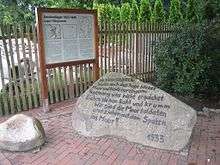Peat Bog Soldiers
"Peat Bog Soldiers" (German: Die Moorsoldaten) is one of Europe's best-known protest songs. It exists in countless European languages and became a Republican anthem during the Spanish Civil War. It was a symbol of resistance during the Second World War and is popular with the Peace movement today. It was written, composed and first performed in a Nazi concentration camp by prisoners.

Background
This song was written by prisoners[1] in Nazi moorland labour camps in Lower Saxony, Germany. The Emslandlager[2] ("Emsland camps") – as they were known – were for political opponents of the Third Reich, located outside of Börgermoor, now part of the commune Surwold, not far from Papenburg. A memorial of these camps, the Dokumentations- und Informationszentrum (DIZ) Emslandlager, is located at Papenburg.
In 1933, one camp, Börgermoor, held about 1,000 Socialist and Communist internees. They were banned from singing existing political songs so they wrote and composed their own. The words were written by Johann Esser (a miner) and Wolfgang Langhoff (an actor); the music was composed by Rudi Goguel and was later adapted by Hanns Eisler and Ernst Busch.[3]
It was first performed at a Zircus Konzentrani ("concentration camp circus") on 28 August 1933 at Börgermoor camp. Here is Rudi Goguel's description of it:[4]
The sixteen singers, mostly members of the Solinger workers choir, marched in holding spades over the shoulders of their green police uniforms (our prison uniforms at the time). I led the march, in blue overalls, with the handle of a broken spade for a conductor's baton. We sang and by the end of the second verse nearly all of the thousands of prisoners present gave voice to the chorus. With each verse, the chorus became more powerful and, by the end, the SS – who had turned up with their officers – were also singing, apparently because they too thought themselves "peat bog soldiers".
When they got to, ... "No more the peat bog soldiers
Will march with our spades to the moor.", the sixteen singers rammed their spades into the ground and marched out of the arena; leaving behind their spades which now had, sticking out of the peat bog, become crosses.
The song has a slow simple melody, reflecting a soldier's march, and is deliberately repetitive, echoing and telling of the daily grind of hard labour in harsh conditions. It was popular with German refugees in London in the Thirties and was used as a marching song by the German volunteers of the International Brigades during the Spanish Civil War. It was soon picked up by other nationalities and it appears in almost all the collected anthologies of Spanish Civil War songs.
The French Foreign Legion use the French version of the song, "Le Chant Des Marais", as one of its marching songs, the sombre tone and timing matching the 88 paces per minute distinctive of the Legion.
The "short" (three-verse) lyrics
Langhoff and Esser's original song[5] runs to six verses, plus refrains (see below). For performance – and, therefore, for most translation – shorter lyrics are used. These omit verses two, three and four of the original.
|
Die Moorsoldaten Wohin auch das Auge blicket.
Auf und nieder geh'n die Posten,
Doch für uns gibt es kein Klagen,
|
Peat Bog Soldiers (loose translation) Far and wide as the eye can wander,
Up and down the guards are marching,
But for us there is no complaining,
|
The full version
This is the full six-verse German version, together with a literal English translation.
| Die Moorsoldaten | Literal translation |
|---|---|
|
Wohin auch das Auge blicket.
|
Wherever the eye gazes
|
|
Hier in dieser öden Heide
|
Here inside this barren marshland
|
|
Morgens ziehen die Kolonnen
|
In the morning, the columns march
|
|
Heimwärts, heimwärts jeder sehnet,
|
Homeward, homeward everyone yearns
|
|
Auf und nieder geh'n die Posten,
|
Up and down the guards are walking
|
|
Doch für uns gibt es kein Klagen,
|
But for us there is no clamoring,
|
References
Further reading
- Hanns Eisler, Bericht über die Entstehung eines Arbeiterliedes, in Musik und Politik, Schriften 1924–1948 (Ed. Günter Meyer, Munich, 1973, pp. 274–280)
- Wolfgang Langhoff, Die Moorsoldaten. 13 Monate Konzentrationslager (new edition, 1995)
- (in French) Le Chant des déportés
- (in German) Die Moorsoldaten
Recordings
- (in German) Die Moorsoldaten Thirty versions from Emsland Concentration Camp Archive
- (in English) broadcast about the Moorsoldaten Lied on Radio Goethe by Arndt Peltner (38'32" mp3, 35MB)
- Pete Seeger – "Songs of The Spanish Civil War: Vol 1" (2006)
- Paul Robeson – "Songs of Free Men" (1942)
- The Dubliners – "Revolution" (1970)
- Swan Arcade - "Swan Arcade" (1973)[6]
- Laurie Lewis – "Spain in My Heart" (2003)
- Theodore Bikel - "From Bondage to Freedom" (1973)
- Ernst Busch – "Spanien 1936–1939"
- Chad Mitchell Trio – "Violets of Dawn" (1966)
- Jamie O'Reilly & Michael Smith – "Pasiones: Songs of the Spanish Civil War 1936–1939"
- Hein & Oss Kröher
- Perry Friedman
- Pi de la Serra
- Hannes Wader – "Hannes Wader singt Arbeiterlieder"
- Welle: Erdball – "Tanzpalast 2000" (1996)
- Helium Vola – "Für euch, die ihr liebt" (2009)
- Glengarry Bhoys – "Eight" (2010)
- Die Toten Hosen – "Die Geister die wir riefen" (2012)
- Various – Die Moorsoldaten: EP-CD with four songs (2015)[7]
- Lankum – "Between the Earth and Sky" (2017)
Footnotes
- "Account Suspended". www.holocaust-education.de. Retrieved 8 June 2018.
- "Esterwegen Labor Camp". www.jewishvirtuallibrary.org. Retrieved 8 June 2018.
- "Account Suspended". www.holocaust-education.de. Retrieved 8 June 2018.
- Original text: Le Chant des déportés (in French)
- Die Moorsoldaten
- "Swan Arcade - Swan Arcade". Discogs. Retrieved 8 June 2018.
- "Neue CD aus heimischen Gefilden: Die Moorsoldaten". 6 December 2015. Retrieved 8 June 2018.